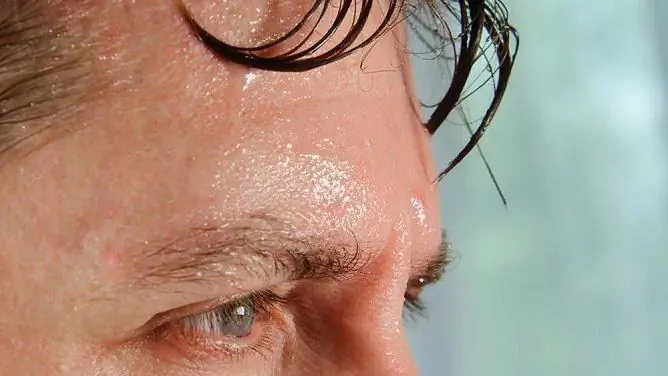- Author Rachel Wainwright wainwright@abchealthonline.com.
- Public 2024-01-15 19:51.
- Last modified 2025-11-02 20:14.
Cheek edema: causes and treatments
The content of the article:
-
Why is the cheek swollen
- After removing a wisdom tooth
- Pathology of teeth and surrounding tissues
- Periostitis of the jaw
- Blunt trauma
- Allergy
- Mumps
- Herpetic stomatitis
- Rare diseases
- Which doctor to contact
-
What to do with edema
- Folk remedies
- Specific treatment
- Video
Cheek edema is not only a cosmetic defect, but often a medical problem. There are many blood vessels in the cheek, and the connective tissue in this area is loose. This facilitates the rapid spread of edema and infection.

What to do if the cheek is swollen depends on the cause of the swelling
Why is the cheek swollen
The causes of cheek edema can be very different - dental, infectious, inflammatory, allergic. Each disease has its own characteristics. Before removing the puffiness, you need to determine its cause, as this directly affects the tactics of treatment.
The main cause of swelling is any pathology of the oral cavity. Less commonly, other diseases cause swelling - infection, allergies, pathology of the sinuses or salivary glands.
| Group of diseases | Nosology |
| Oral cavity pathology | Caries, periodontitis, gingivitis, abnormal growth of the wisdom tooth, periostitis |
| Injury |
Mechanical trauma - contusion, injury, biting, tooth extraction. Thermal injury (hot food burn) |
| Allergy | Allergic reaction to medication, Quincke's edema |
| Infections | Herpes, mumps |
| Pathology of nearby organs |
Sinusitis Sialadenitis (inflammation of the salivary glands) |
| Others | Rare diseases (for example, Melkersson-Rosenthal syndrome), dysfunction of internal organs - heart, kidneys, thyroid gland |
After removing a wisdom tooth
Often, after removing a wisdom tooth, the gums swell, and the swelling can pass to the cheek. Symptom onset is rarely cause for concern. This is a normal reaction of the body to injury - an incision in the gums, damage to the mucous membrane, etc. The affected area may hurt and look reddened. The swelling usually goes away on its own.
Pathology of teeth and surrounding tissues
In most cases, the cheek is swollen due to diseases of the teeth, periodontal, gums.
The following diseases can lead to swelling of the cheeks:
- caries;
- periodontitis - periodontal inflammation;
- gingivitis - inflammation of the gums;
- improper growth of a wisdom tooth.
Such diseases usually have several common features - edema, severe toothache, fever.
Periostitis of the jaw
Periostitis is an inflammation of the periosteum that occurs due to inflammatory diseases of the teeth. In the people, periostitis of the jaw is often called a gumboil.
Periostitis begins with a slight swelling of the gums. Over time, the swelling increases, pain joins. A purulent focus is formed - an abscess, which is the cause of the swelling of the cheek.
Blunt trauma
Trauma is one of the most common causes of cheek swelling. A blow or push on the face often does not compromise the integrity of the skin, but does damage the soft tissue. Swelling develops in response to damage. On the skin, in addition to swelling, the consequences of trauma are revealed - hematomas, soreness, abrasions.
Allergy
Puffiness can occur due to an allergic reaction to the administration of medications. For example, be the result of an injection of lidocaine during dental procedures.
In severe cases, an immediate type of allergic reaction develops - Quincke's edema. This is accompanied by the following symptoms:
- swelling of the face (cheeks, lips, tissue around the eyes);
- numbness of the skin;
- with airway obstruction - respiratory failure, choking, hoarseness.
Symptoms appear acutely, within minutes. Quincke's edema can develop in response to contact with any allergen. Medicines, foodstuffs, pollen of plants, animal hair can act as an allergen. With angioedema of this type, a person needs emergency help.
Mumps
A common cause of cheek swelling is inflammation of the parotid salivary glands (mumps). Several factors can lead to the development of mumps:
- viral infection;
- injury;
- hypothermia;
- spread of bacterial infection from the mouth.
Epidemic (viral) mumps is more common in childhood. Non-epidemic mumps mainly affects older people.
Mumps is characterized by:
- swelling in the parotid region;
- dry mouth;
- pain when chewing;
- increased body temperature.
Herpetic stomatitis
A herpes infection can lead to swelling of the cheeks. When the oral cavity is damaged, herpetic stomatitis develops, less often gingivostomatitis. The disease is characterized by:
- the appearance of a characteristic rash - bubbles with transparent contents;
- swelling of the mucous membrane;
- redness;
- the formation of painful erosions after opening the vesicles against the background of swelling.
With the development of herpetic gingivostomatitis, the gums additionally swell. Their mucous membrane has a purple tint, the affected areas are painful, there is increased salivation.
Rare diseases
Rare diseases such as Melkersson-Rosenthal syndrome can cause cheek edema. This pathology is characterized by a triad of symptoms: an increase in the size of the lips, a folded tongue and paralysis of the facial nerve. In rare cases, Melkersson-Rosenthal syndrome may present with only one cheek edema. At the same time, the mucous membrane looks edematous, with teeth imprints.
Which doctor to contact
If the swelling persists, and the general state of health is disturbed, you need to see a doctor. Which specialist to contact depends on the primary disease:
- in case of Quincke's edema with respiratory failure, you need to call an ambulance;
- for caries, gum disease - to the dentist;
- with sinusitis - to the otolaryngologist;
- for other diseases - to a therapist.
What to do with edema
First of all, you need to establish the cause of the swelling. Further actions should be aimed at eliminating the primary disease. For this, medications can be used - antiviral, anti-inflammatory, antiallergic. Additionally, local treatment is used - rinses, compresses, ointments.
Folk remedies
For treatment, you can use folk remedies. They will help relieve swelling, but they will not get rid of the underlying disease. Folk recipes can complement medication.
What folk remedies are used:
- Cold compress. An ice pack or gauze soaked in cold water can be applied to your cheek. The swelling will go away faster under the influence of cold.
- Rinse with baking soda solution. To prepare the solution, you will need 1 teaspoon and 1 glass of water. You need to rinse your mouth 3-4 times a day.
- Gargling with a decoction of medicinal herbs. You can use chamomile, sage, calendula. The broth is prepared at the rate of 1 tablespoon of herbs per 400 ml of boiling water.
- Raw potato compress. Grate the potatoes on a coarse grater. A gauze bandage is applied to the skin, and grated potatoes are applied on top.
- Aloe. Aloe juice can help reduce inflammation and swelling. An aloe leaf or a tampon dipped in juice is applied to the inside of the cheek.

In some cases, a cold compress can help.
Specific treatment
The main treatment is to eliminate the cause of the swelling. With adequate therapy of the underlying disease, the swelling of the cheek goes away on its own, no additional effort is required.
Treatment methods are shown for various diseases:
| Disease | Treatment methods |
| Tissue swelling after tooth extraction | In most cases, no specific treatment is required. It is enough to follow the recommendations of the dental surgeon. The swelling goes away in 2-3 days. |
| Periostitis | Treatment is predominantly surgical. An opening of the purulent focus, sanitation and installation of drainage is carried out. Anti-inflammatory drugs can also be used: Lornoxicam, Meloxicam. |
| Herpetic stomatitis |
Antiviral drugs are used for treatment: Acyclovir, Valacyclovir (Valtrex), Gerpevir. The tablets should be taken 5 times a day, the duration of treatment is 5-7 days. Additionally, local preparations are prescribed - treatment with saline, Oxolinic ointment, Tebrofen ointment. |
| Parotitis | Specific treatment is not carried out due to the lack of drugs of etiotropic action. Recommendations include bed rest, drinking plenty of fluids, a gentle diet, and warm compresses. |
| Contusion of tissues |
With a shallow wound, specific treatment is not required. It is enough to apply a cold compress, to ensure peace of the mucous membrane (eat liquid food, exclude hot and cold). If the wound is deep, stitches may be required. |
Video
We offer for viewing a video on the topic of the article.

Anna Kozlova Medical journalist About the author
Education: Rostov State Medical University, specialty "General Medicine".
Found a mistake in the text? Select it and press Ctrl + Enter.






